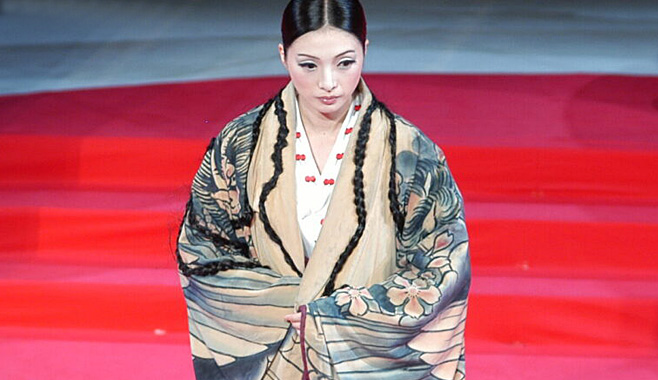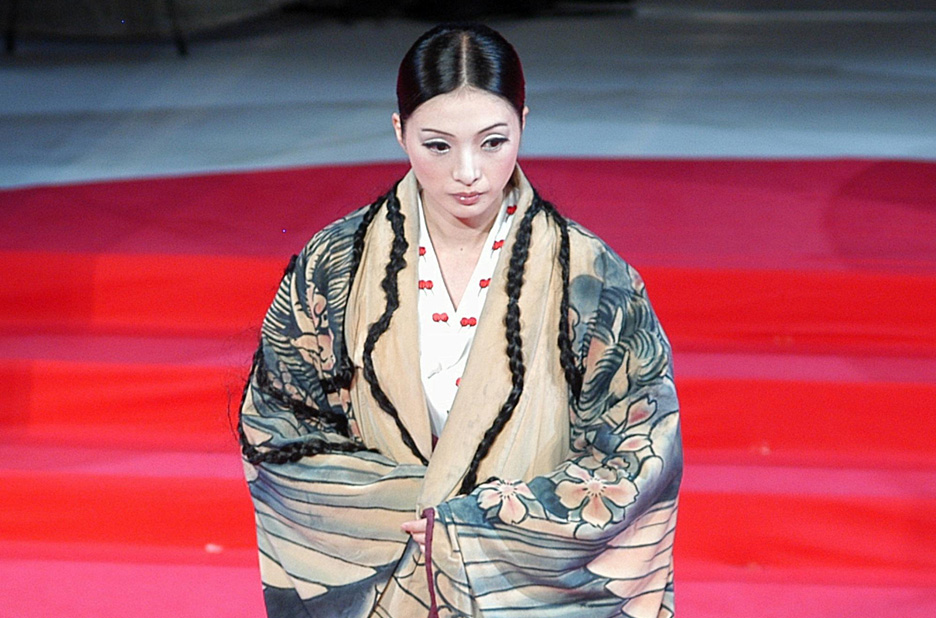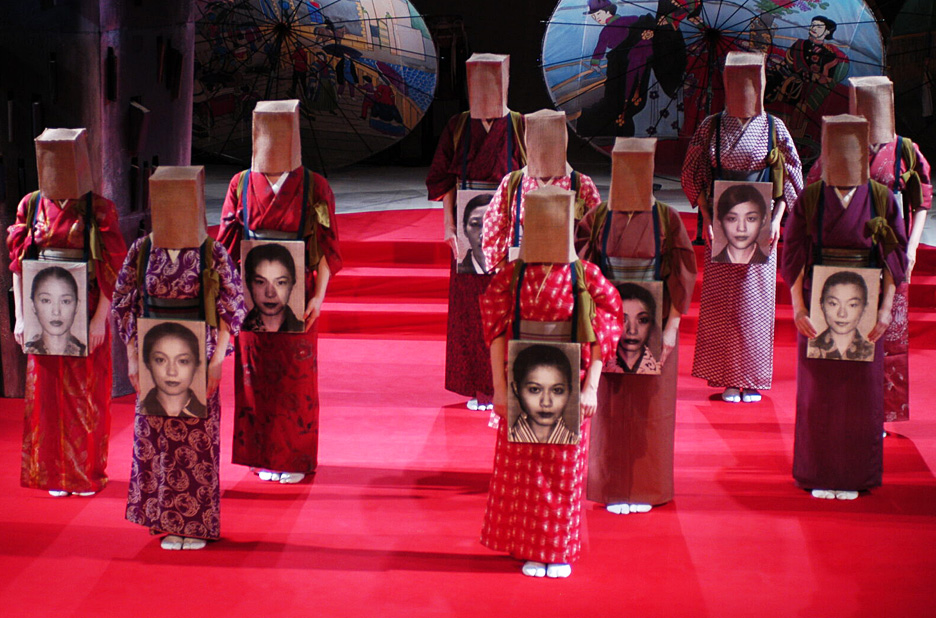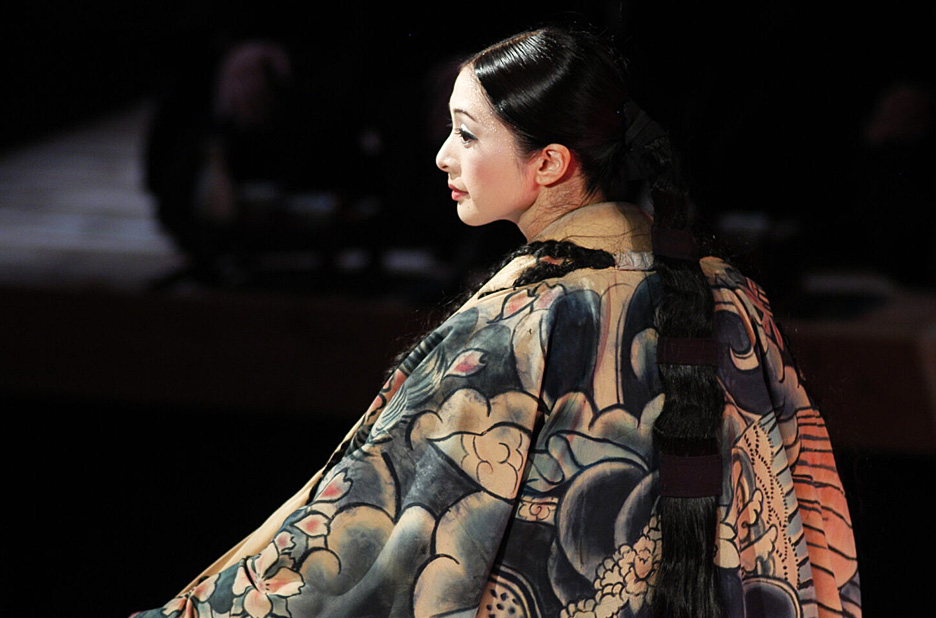Theatre
Medea
The Coronet Theatre, London
5/5
Mesmerising dualities
Japanese theatre company Shizuoka Performing Arts Centre (SPAC) directed by their artistic director Satoshi Miyagi present one of the highlights of their repertoire, a superb reimagining of Euripides’ Medea, where traditional and modern interpretation fuse in a hypnotic evening of pure substance imaginatively capturing the awe and energy of this ancient piece. The Coronet Theatre has secured the UK première of this excellent work that has been touring since its first performance in 1999. More of this please Coronet.


The play opens with women in traditional kimono dress, restaurant staff as we find out, slowly populating the stage, their heads covered with brown paper bags, holding a black and white portrait of themselves. This immediately introduces the theme of the separation of body and mind, movements and thoughts, the inner and outer self, the forced or desired duality which sets into motion a fruitful and thought-provoking interpretation of this challenging play. After the women have taken their positions, a vagrant stumbles onto the stage, so ramshackle that for a moment I thought a homeless Notting Hill man has gate-crashed our performance. He sits mutely at the edge observing the action until the end.
Female restaurant staff start enacting the play to entertain a self-satisfied group of male guests. But it is the men that voice the lines while the women mutely enact them. The male actors are ‘speakers’ and the female ‘movers’, and very quickly we accept this doubling as natural. All the actors are excellent and mesmerising without exception. At no moment is the action lagging despite its slow Kabuki-style physicality accompanied by frenetically delivered lines. Being part of the play visibly transforms the jovial male guests who completely give themselves over to the spirit of the text.
At first it seems that the women are short-changed and demeaned. They are lasciviously chosen by the men from their pictures and have to silently perform. All their thoughts and spoken lines are said by the men. But the power of the women’s performance slowly takes over and we see that the words, although expertly delivered and essential to understanding the action, mean less than the presence of the characters living them. The bodies severed from their words are incredibly poignant and powerful.

Women perform male characters too and although all female performers are dressed up for their parts, they don’t try to look like the men. The way these women are attired and made up incorporates both humorous satire and traditional Japanese theatrical approaches. The evening was hot, and Coronet’s weak air conditioning no match for the old building’s ability to retain the heat. Under heavy make-up, the actor’s faces were stoically streaming with sweat.
A screen covered with copies of Japanese prints hides the orchestra dominated by Japanese drums and percussion. Their music punctuates the drama with severity and precision. It is amazing to witness the taiko affectingly denoting such a variety of emotions: foreboding, tension, tragedy, sadness, vulnerability and inevitability.
The evening showed how the magic of theatre operates. You don’t really need to understand the language spoken or the theatrical tradition of Japan, what happens on stage will still speak to you, move you and enthral you. I wondered whether this is how the audience felt in Ancient Greece, as if discovering a new continent of meaning and interpretation enacted with apparent ease and simplicity.

We understand Medea’s character fully, which is not a forgone conclusion. Her words spoken by the male actor Kazunori Abe’s deep dramatic voice with a wide range of pitch, modulation and emotion, flesh out her feelings. The physical acting of the female double played by Micari which often becomes a ritual dance cleverly marks the constraints of Medea’s life as a foreign, Asian woman in Ancient Greece, as well as her rage, dignity and pride. The reversal of traditional roles with the male actors expressing emotions and the female actors retaining full composure and dignity felt rewarding. The duality was also reminiscent of the puppet theatre, but here it was not the puppet master who held all the strings.
The surprise comes at the end when the female crew after completing the play slay their male doubles. The revenge is thereby complete. Women can now speak for themselves in any way they wish, but in their simple red dresses freed of the kimonos they still choose to stay silent. The vagrant stays on the stage well after the company have taken their bows, sadly contemplating the tragedy of what we have seen and heard.